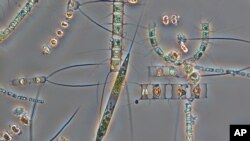The global population of a marine algae called phytoplankton has declined by 50 percent since the middle of the last century, threatening marine creatures that depend on the microscopic plant for food. Scientists blame global warming for the trend.
Tiny green phytoplankton are a food staple for many ocean creatures, according to marine biologist Daniel Boyce of Dalhousie University in Nova Scotia, Canada. Boyce says phytoplankton are similar to trees and grass on land.
"They produce energy through the process of photosynthesis. So in the presence of sunlight, they convert inorganic energy to organic energy. And by doing this, they form the base of the entire marine ecosystem. So they are the food for everything -- from little zooplankton up to the big whales," he said.
Boyce and his colleagues compiled and analyzed data going back to the 1800s. Researchers found that the amount of phytoplankton had decreased about one percent of the global average per year with about a 40 percent decline since 1950. The strongest trends were found in the Northern Hemisphere.
Boyce says researchers analyzed the data derived from a low tech device called a secchi disc.
"It looks like a white dinner plate. It's a disc with a rope attached to it. And the person collecting data lowers this disc into the water, while [it is] attached to the rope. And they measure the depth where the disc can no longer be seen. And that's recorded as the water clarity or the secchi depth. And it turns out that this depth, this water clarity, correlates quite well to the amount of phytoplankton in the upper oceans. So it's a good measure of the amount of algae in the upper oceans," he said.
Combining the secchi disc data with information from more modern algae measurement tools, Boyce says researchers constructed a database of almost a half-a-million ocean measurements dating to the year 1899.
Biologists then plugged the measurements into a computer model that estimated global changes in the amount of phytoplankton over time. Scientists say the greatest algae declines have occurred in the polar and tropical regions and the open oceans, where most phytoplankton production occurs.
Researchers say that rising ocean surface temperatures, due to global warming, are affecting the growth of phytoplankton, which need sunlight and nutrients from below the surface to grow. They say that warmer water limits the amount of nutrients that are delivered to the surface from the cooler ocean depths.
Phytoplankton are critical to the health of our planet, according to Boyce, who says ocean algae produce half of the oxygen we breathe and reduce the amount of carbon dioxide that otherwise would contribute to global warming. "They affect the stability of our global climate. And they can have the potential to affect our fisheries as well. So phytoplankton are extremely important to us and we should be very concerned that phytoplankton has declined over this long time period," he said.
An article highlighting global reductions in marine algae is published in the journal Nature.
Scientists Report Steep Decline in Algae Critical to Marine Food Chain




